| Srl | Item |
| 1 |
ID:
135251
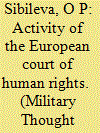

|
|
|
|
|
| Summary/Abstract |
The author examines Russia’s national security problems originating from the flaws in its legal system and takes a close look at the operation of Russian courts and the European court of human rights.
|
|
|
|
|
|
|
|
|
|
|
|
|
|
|
|
| 2 |
ID:
119188
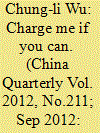

|
|
|
|
|
| Publication |
2012.
|
| Summary/Abstract |
While the judicial system is an important part of any given political regime, other than in a few Western countries, it has received comparatively little attention. This study employs vote-buying litigation as a litmus test to inquire whether or not the judiciary in Taiwan is politically biased in its judgments. Vote buying has long marred Taiwan's elections and the general public does not seem to trust the judicial system to be independent of political influences. This study examines the impact of political variables (including partisanship, whether candidates are elected or not, and the type of election) on court decisions in vote-buying litigation between 2000 and 2010. The article looks at these decisions at three levels: district courts, high courts, and the Supreme Court. The empirical findings indicate that the effects of political factors are considerably less an influence than expected on trial outcomes.
|
|
|
|
|
|
|
|
|
|
|
|
|
|
|
|
| 3 |
ID:
121049
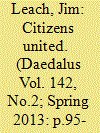

|
|
|
|
|
| Publication |
2013.
|
| Summary/Abstract |
The 2010 Citizens United ruling has been widely reviewed from the lens of legal precedent. In this critique, the author suggests the need to examine the logic and effects of the ruling from a historical, philosophical, and linguistic perspective. He challenges the Court's basis for providing inanimate entities First Amendment protection to "invest" in politics by equating corporations with individuals and money with speech. He holds that Citizens United employs parallel logic to the syllogism embedded in the most repugnant ruling the Court ever made, the 1857 Dred Scott decision. To justify slavery, the Court in Dred Scott defined a class of human beings as private property. To magnify corporate power a century-and-ahalf later, it defines a class of private property (corporations) as people. The effect is to undercut the democratic basis of American governance.
|
|
|
|
|
|
|
|
|
|
|
|
|
|
|
|
| 4 |
ID:
084784


|
|
|
| 5 |
ID:
084785
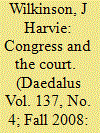

|
|
|
| 6 |
ID:
084786
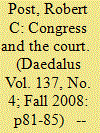

|
|
|
| 7 |
ID:
143181
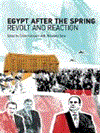

|
|
|
|
|
| Publication |
London, IISS, 2016.
|
| Description |
223p.pbk
|
| Series |
Adelphi Paper Series; 453-454
|
| Standard Number |
9781138653429
|
|
|
|
|
|
|
|
|
|
|
|
Copies: C:1/I:0,R:0,Q:0
Circulation
| Accession# | Call# | Current Location | Status | Policy | Location |
| 058454 | 962.056/HOK 058454 | Main | On Shelf | General | |
|
|
|
|
| 8 |
ID:
127060
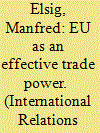

|
|
|
|
|
| Publication |
2013.
|
| Summary/Abstract |
Drawing on the European Union (EU) foreign policy literature on effectiveness, this article studies how the European Union chooses judges to serve on the World Trade Organization's key judicial institution: the Appellate Body. Conceptually, the article differentiates between effectiveness in representation and effectiveness in impact. The article shows how delegation to the European Commission has increased the strategic agenda-setting power for championing its preferred candidates. The article further compares European and US practice in nominating candidates. Overall, the article finds that effectiveness in representation has increased over time. In terms of effectiveness in impact, the article shows how the international environment conditions the EU's influence. The article also exposes the difficulties of studying the effectiveness of EU external relations due to the peculiar decision-making processes dominant in judicial bodies.
|
|
|
|
|
|
|
|
|
|
|
|
|
|
|
|
| 9 |
ID:
106834
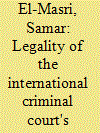

|
|
|
| 10 |
ID:
108251


|
|
|
|
|
| Publication |
2011.
|
| Summary/Abstract |
This article explores the possibility of locating an 'ethics of memory' respecting commission of mass atrocities via the link between justice, truth and memory. First, it suggests a typology for memory in relation to justice in its retributive and restorative aspects. Second, it explores how so-called 'memory-justice' arises in the course of international proceedings-and particularly given its significance under the Rome Statute-by considering, critically, the international community's ability to repair or restitute injury by engaging in memory in 'the right way'. Lastly, it suggests limitations of memory-justice of which only some can be overcome. The challenges and arguments for a 'categorical imperative' for memory are left for a subsequent treatment, but arguments in law and practical ethics will be suggested in favour of properly approaching memory in pursuit of justice, with profound consequences for the nascent Court and sister tribunals, in their efforts to break the cycle of conflict in affected regions, and rid the world of the worst crimes known to humanity.
|
|
|
|
|
|
|
|
|
|
|
|
|
|
|
|
| 11 |
ID:
102998
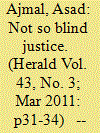

|
|
|
| 12 |
ID:
100299
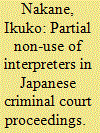

|
|
|
|
|
| Publication |
2010.
|
| Summary/Abstract |
This paper reports findings of a study which examined court proceedings with the presence of an interpreter in Japanese criminal courts. With the increasing awareness of language rights over the last decade and the recent introduction of the saiban-in (lay judge) system, courtroom discourse involving non-Japanese speaking background (NJSB) people is increasingly under scrutiny as an issue of language in public spaces, and improvements have been made in provision of legal interpreting. The present study focuses on partial non-use of the interpreter, an aspect of court interpreting that has been little discussed and hidden behind the published statistics and public discourses on legal interpreting in so-called 'foreigner cases'. It examines which stages of trials are interpreted and which are in Japanese only, and presents an analysis of courtroom interaction involving an NJSB defendant without interpreter mediation. Using Halliday's register framework, the paper discusses courts' decisions regarding partial non-use of interpreters and problems associated with it. While the partial use of interpreters for the highly technical legal genre indicates the courts' effort to provide fair trials for second language speakers, it is argued that a simplistic view of register overlooks the risks involved in not using an interpreter in ostensibly non-technical questioning of the defendant.
|
|
|
|
|
|
|
|
|
|
|
|
|
|
|
|
| 13 |
ID:
100265
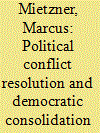

|
|
|
|
|
| Publication |
2010.
|
| Summary/Abstract |
This article argues that Indonesia's Constitutional Court has played a significant role in that country's transformation from a violence-prone polity into Southeast Asia's most stable democracy. The Court has advanced institutional conflict resolution mechanisms and expanded democratic rights-two achievements identified by Linz and Stepan as major indicators of a consolidating democracy. Building on models developed by Ginsburg and Horowitz, my analysis also illustrates why the Court has been able to defend its autonomy and become an agent of democratization. While sharing Ginsburg's emphasis on high levels of power diffusion as a key reason for the Court's success, this article moves beyond such an approach. Most importantly, it suggests that the judges' "judicial activism"-as expressed in a number of controversial but popular decision-increased Indonesian society's support for the Court to such an extent that is has now become largely invulnerable to attempts of external intervention.
|
|
|
|
|
|
|
|
|
|
|
|
|
|
|
|